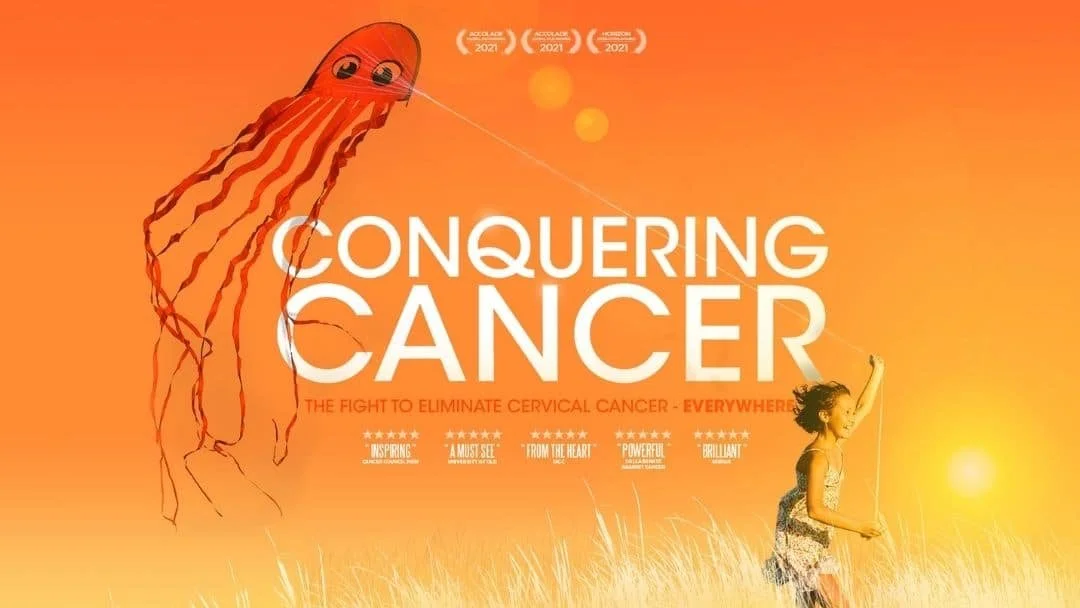Cervical Cancer Could Soon Be Eliminated
Every two minutes somewhere around the globe, a woman dies of cervical cancer. In Australia, by contrast, this cancer is on the brink of elimination. Cervical cancer could disappear from this country by 2030, thanks to the introduction of the HPV vaccine – created here in Australia – in combination with our thorough screening program.
“Eliminating cervical cancer is one of the most extraordinary health stories of our time,” says filmmaker Sue Collins, director of the documentary, Conquering Cancer: Making History By Eliminating Cervical Cancer Everywhere.
Yet she cautions that some women are being left behind. “More than 900 Australians are still diagnosed with the disease each year, and most of these patients have rarely or never been screened for cervical cancer.
“Aboriginal and Torres Strait Islander women, as well as women from migrant or non-English speaking backgrounds and members of the LGBTIQ+ community, schedule their cervical screenings far less regularly than their non-Indigenous, heterosexual sisters. “It is really important we remove the barriers and provide culturally safe access,” she says.
Collins says that winning the battle against cervical cancer shows what is possible. “We produced the Conquering Cancer film to shine a light on the amazing work that is already underway to make this happen.
“Imagine what this could mean for other cancers? Maybe Conquering Cancer will be the catalyst to inspire the next innovation that moves us towards a cancer free-world. Dare to dream.”
Human Papilloma Virus (HPV) is responsible for 99 per cent of cervical cancer. It’s an extremely common virus – an estimated 80 per cent of people will have an HPV infection at some point. The virus can create abnormal cells in the cervix many years before those abnormal cells turn into cancer, but regular cervical screening can detect pre-cancerous cells, meaning the cancer can be caught before it’s really there.
“That’s why regular cervical screening, through Pap tests or the new HPV tests, is so important for early detection. If abnormal cells are found, it’s very easy to remove them.
““Most women never get more than one or two tests in their lifetime, if at all. They simply don’t have access to them.””
“And in new news, it’s just been announced that self-collection will be available to anyone eligible for a cervical screening. That means, you can do the test yourself in privacy, which takes away another barrier to having the test. They are as reliable as a physician administered test. Win win.”
Collins says that even people who have had the HPV vaccine need regular cervical screenings. “There is a chance, even if it’s remote, that you were exposed to HPV before you were vaccinated. Long story short – if you’re due for a cervical screening, get it done because it could save your life.”
Our screening system can keep us safe from a cancer that, in other parts of the world, is the No. 1 cause of death in women.
“The vast majority of women on this planet face an inequity in healthcare that those of us living with robust health systems find hard to comprehend. In fact, on our first filming trip to Geneva, I realised I was a few weeks overdue for my Pap smear. Then I learnt that for most women, they never get more than one or two tests in their lifetime, if at all. They simply don’t have access to them.”
Some global heavyweights have added their voices to the fight.
“When I interviewed Dr Tedros Adhanom Ghebreyesus, director-general of the WHO – big name drop, I know! – I asked him why he was so passionate about cervical cancer elimination. He told me how moved he was by a film he’d seen sharing the story of a young woman who had survived cervical cancer and miraculously had a child after treatment. As he told me the story, I realised he was describing in detail a story that I’d produced! He’d seen our short film Kirsty’s Story. What are the odds!”
Ultimately, Collins’ wish is that Conquering Cancer raises awareness of what’s possible.
“I hope this film will remind women to get their cervical screenings, and remind their friends and family. That it will give them confidence to have their children vaccinated with the HPV vaccine. And in countries where there are not adequate services, I hope it encourages women to ask for services. That it encourages policy makers to prioritise cervical cancer prevention methods and that it pushes the world towards elimination of this preventable disease.”
February and March Screenings in Sydney, Melbourne, Brisbane, Canberra and Darwin are scheduled to take place around World Cancer Day on February 4. See Conquering Cancer, @conqueringcancercampaign

